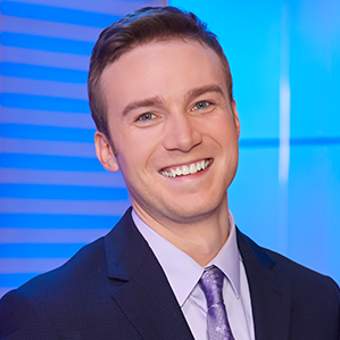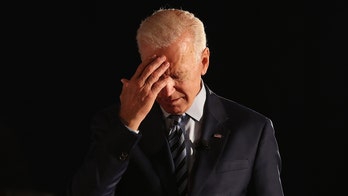Fox News Flash top headlines for October 20
Fox News Flash top headlines are here. Check out what's clicking on Foxnews.com.
After a contentious first debate, President Donald Trump and Democratic nominee Joe Biden are once again set to take the stage on Thursday, but this time, the deaf community is hoping there will be one more person on that stage – an interpreter.
Erin Rosenfeld was one of the millions of Americans who tuned in to watch the first debate last month but quickly turned it off after struggling to keep up with the closed captions as Trump and Biden spent the next hour interrupting and talking over one another.
“I just could not understand what was being said -- there were no ASL [American Sign Language] interpreters on the screen,” Rosenfeld said, adding that the “closed captioning is really delayed and often full of mistakes.”
“I just left the room because I was not gaining anything from the debate,” she said.
More than ten million Americans are deaf or have significant trouble hearing, according to the 2018 disability compendium report, yet there has never been a sign language interpreter for a live presidential debate shown on television, according to Bridges for the Deaf and Hard of Hearing, a nonprofit organization pushing for equality and equal access.
“We never had one. So, it's not anything new to us. We're used to it,” Alex Abenchuchan, who is deaf and is the host of The Daily Moth, a YouTube show that covers politics, news and trending stories using American Sign Language.
Thursday is the final debate and the last opportunity for voters to hear from the candidates on a national stage. Bridges for the Deaf and Hard of Hearing is trying to ensure the deaf community has equal access by requesting the commission on presidential debates to have an interpreter on stage.
“If our voice is heard, then you will see an interpreter live somewhere on that screen, and the public will also see that as well,” Mike Helms, vice president of Bridges for the Deaf and Hard of Hearing told Fox News. “We do want to see sort of what's going on with the back and forth between the two candidates and watch the whole dynamic of the political environment.”
The organization has reached out to both presidential campaigns, the Tennessee Democratic Party and Belmont University, where the debate will be held, asking for an interpreter to be present and even offered to provide one.
As of Monday, Helms said he received a response from the Tennessee Democratic Party, which “considered” the request but ultimately decided DPAN was enough and from the presidential debate commission via correspondence with Belmont University that said it would provide an interpreter if someone in the live audience is deaf.
“Belmont University has told us that the debate commission believes that captions are sufficient, but that they would provide interpreters if there was a deaf person in the physical audience,” Helms added. “But our goal is to let them know what those are going to be, people who are going to be watching that debate live.”
Fox News reached out to the Trump campaign, the Biden campaign, and the commission on presidential debates asking whether an interpreter will be provided for this week’s debate, but did not receive a response.
Helms pointed out that Biden and Vice Presidential nominee Kamala Harris do routinely feature an ASL interpreter during their campaign events, however, it is via the Internet and Helms wants “equal access on public airways for all citizens.” He has not seen one used by the Trump campaign.
The White House is now required to provide sign language interpreters during public COVID-19 briefings after a lawsuit was filed last month by The National Association of the Deaf (NAD) and five other plaintiffs.
Rosenfeld feels the deaf community has been “overlooked for way too long” when it comes to “accessibility in election and campaigns,” but also everyday life.
For example, closed captioning didn’t become available until 1973 when ABC News began offering the only timely newscast for the deaf and hard of hearing. In 1990 the Television Decoder Circuitry Act required caption-decoding technology on new television sets 13 inches or larger, and in 1996 Congress expanded on the law mandating digital television receivers also have the same technology, according to the National Captioning Institute.
Requirements for providing closed captioning for video content on the Internet wasn’t enforced until 2010.
“Way back when, like in the 1980s, the 70s, the 60s, the captioning wasn't required by law. So, it was no captioning, maybe deaf people had to depend on family members to tell them this president is better or this one is better,” Abenchuchan said. “You know, deaf people were the last people to know. So now it's a lot better. But, you know, our government can do better.”
Rosenfeld, who created a TikTok calling for equal access for the deaf community following the first presidential debate that has since gone viral, also noted that English is not the native language for people who are deaf.
“ASL and English are completely different languages. And so in English, it's sometimes really not beneficial and they rely on interpreters instead,” Rosenfeld added.
If someone needs an ASL interpreter they can turn to Deaf Professional Arts Network (DPAN), which produces its own live stream of the debate for people who are deaf or hard of hearing to watch online. And, while DPAN is a great resource, it still requires Internet access and a computer that isn't available to millions of lower-income Americans.
Instead, Rosenfeld is calling on the news networks to provide a sign language interpreter.
“It should be on every single news network. There should just be interpreters on the screen the whole time,” she said.
The 19-year-old is voting for the first time this November and hopes the deaf community is afforded the same access as others so she and the rest of those who are deaf and heard of hearing can make an informed decision at the ballot box.
“The deaf community loves politics, you know, just as much as hearing people do. It's the same thing. You know, the debating, the division, you know, the everyday political life. But we have less access,” Abenchuchan said, who is making it a point to vote in person to make sure his ballot goes through.






